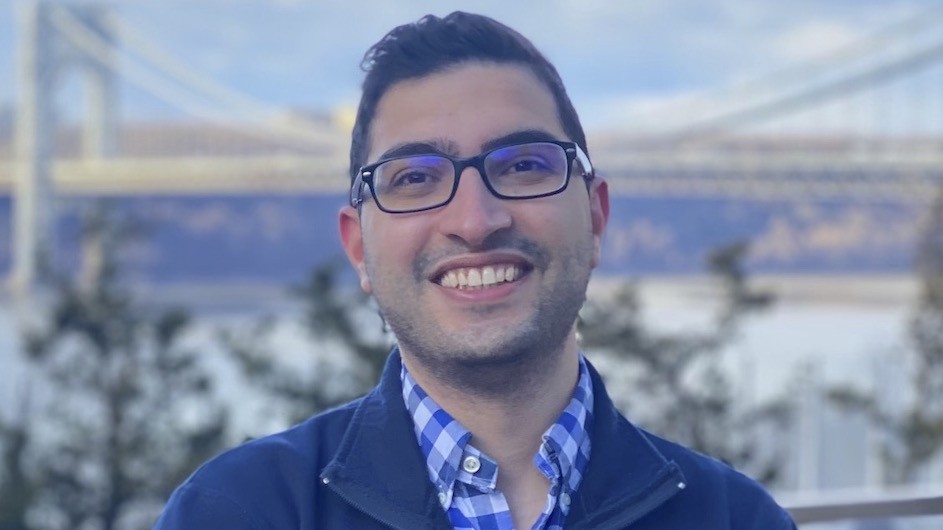Using Medicine to Improve the Health of Underserved Groups
Omid Cohensedgh's childhood experiences inspired him to enter the field of medicine.

Notebook is a Columbia News series that highlights just some of the many fascinating students who study at our University.
Omid Cohensedgh came to Columbia to pursue his undergraduate degree in biology and Middle Eastern, South Asian, and African Studies, and he’s stuck around since: He’ll graduate with a medical degree from the Vagelos College of Physicians and Surgeons at Columbia University Irving Medical Center (CUIMC) this spring. We caught up with Cohensedgh to discuss what got him interested in medicine, how he plans to use his degree to improve the health of underserved groups, and, of course, the best places across the city to grab a bite to eat.
What drew you to a career in medicine?
I was raised by a single mom who is legally blind, and so growing up, I saw first-hand how illness can impact a person’s life and the lives of their loved ones. At the same time, I witnessed how physicians had the unique ability to connect with their patients and guide them through their experience of illness. This sparked my initial interest in medicine, which was further solidified by my experiences in college (at Columbia!), including my time working at the Gay Health Advocacy Project and conducting biomedical research at CUIMC. I also saw a career in medicine as a way to connect with and give back to communities that have been historically underserved, including the LGBTQ+ community.
What do you hope to do after you finish medical school?
I’m in the process of applying for residency in psychiatry at the moment, so after graduating, I plan to start my first year as a resident! I’m still exploring my specific interests within psychiatry (some contenders include child and adolescent and consultation-liaison psychiatry), but I know that I want to continue working with patients from marginalized backgrounds, including patients who identify as sexual and gender minorities. Long term, I also hope to be involved in medical education, which is another passion of mine within medicine.
How did you get involved with Vagelos’ Equity and Justice Fellowship, and what does your role there entail?
The Equity and Justice Fellowship is a program at Vagelos that aims to develop curricular initiatives in anti-racism and health equity. I got involved with the fellowship because I wanted to help expand our curriculum to be more inclusive, better preparing students to provide high quality care to the patients we look after. As part of the fellowship, I have helped to develop and lead an elective course entitled “Racism and Health” for fourth-year medical students who are interested in learning more about the legacy of racism in medicine and how to promote anti-racism work in their medical careers. Getting to discuss these important issues with my classmates has been one of the highlights of my time in medical school. I’ve also helped develop a module on providing trauma-informed care to patients who identify as transgender, gender-diverse, and intersex, which has now been integrated into our clinical year curriculum.
How do you like studying in New York? What are your favorite things to do in the city?
Getting to live in NYC while being a medical student has been a dream! At the medical campus, we’re lucky to have the Vagelos Education Center, where I have spent plenty of time studying for exams and hanging out with classmates. Harkening back to my undergrad days, I sometimes head down to the Morningside campus to study at Butler Library. Here are some of my other favorite activities around the city: Nitehawk Cinema in Williamsburg (an independent movie theatre that also serves food and drinks), MoMA PS1 (free concerts in the summer), Gantry Plaza State Park (in Long Island City—amazing views of Manhattan, go at sunset), and the Cloisters (really pretty foliage in autumn).
Any suggestions for incoming medical students on how best to navigate the city, and the best places to eat, grab books, or explore?
My advice would be to explore the city as much as you can, including outer boroughs. We’re lucky to have the express A train right on campus, which can take you to midtown in 20 minutes. Some of my favorite places to eat in the city are: Ravagh (Persian food on the Upper East Side—get the tahdig with a stew), Chai Thai Kitchen (Columbus Circle—get the Khao Soi and peanut dumplings), Asian Jewels (dim sum in Flushing), and BCD Tofu House (Korean restaurant open until 1 AM).